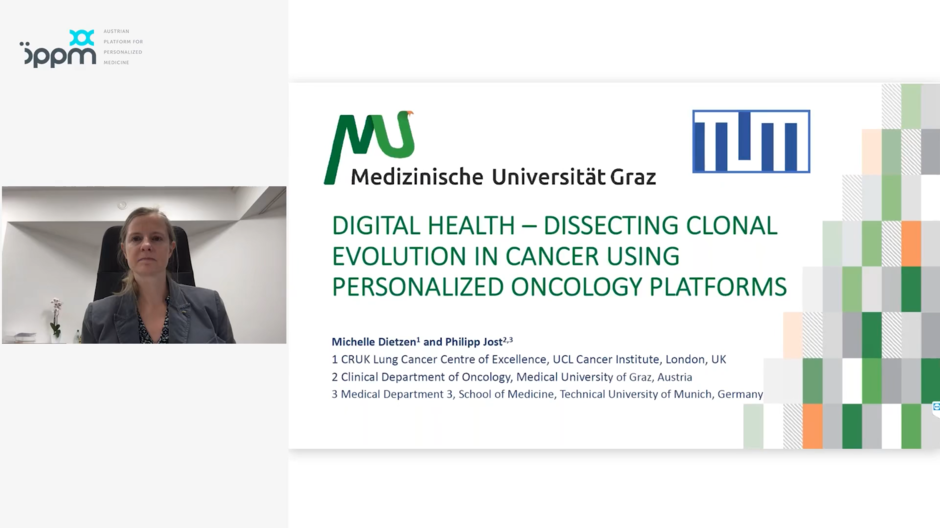- Home
- Webinar Series
Webinar Series
ÖPPM Webinar -"Sense and Sensitivity: Computer-aided Facial Phenotyping in Individuals with Genetic Syndromes"
Webinar 1 - 20.10.2020, 16:00 - 17:00
In my lecture, I will give an introduction into the topic of computer-aided facial phenotyping. I will discuss the approache's strengths and limitations and how to use it for faster exome diagnostics in patients with genetic syndromes.

About me:
Dr. med. Martin A. Mensah (Charité Berlin, Germany)
As a physician I am currently completing my specialist training as a human geneticist at the Institute for Medical Genetics and Human Genetics of the Charité - Berlin. I am a fellow of the Digital Clinician Scientist Program of the Berlin Institute of Health with my main research area being the computer-aided interpretation of image data from patients with genetic syndromes.
The talk and the discussion are chaired by
Univ.-Prof.in Dr.in med.univ. Barbara Obermayer-Pietsch (Medical University Graz, Austria)

Wir möchten Sie darauf hinweisen, dass nach der Aktivierung Daten an Google übermittelt werden. Weitere Infos finden Sie in unserer Datenschutzerklärung. Akzeptieren
ÖPPM Webinar -"Public perspectives on the donation and sharing of genomic and health information: findings of a global study"
Webinar 2: 24.11.2020, 16:30 - 17:30
In this talk, I discuss the importance of public and patient perspectives in the development of genomic medicine, and present the findings of the Your DNA, Your Say study. Your DNA, Your Say is a survey of public attitudes towards the donation and sharing of genomic and health data, including 37,000 responses in 15 languages across 22 countries. I present the findings of the study in relation to people’s willingness to donate data about them for clinical and research use, and examine how this is influenced by their familiarity with genetics, their views of genetic information and their trust in those responsible for collecting and managing data.
About me:
Dr. Richard Milne (Wellcome Genome Campus)
I am a social scientist based in the Society and Ethics Research group at the Wellcome Genome Campus, where I lead on the analysis of the Your DNA, Your Say study, and conduct research on social and ethical questions associated with the collection and use of biodata, and the development of tools for the early detection of common disease. I also co-lead work on Ethical, Legal and Social Implications within the University of Cambridge Public Health initiative.
The talk and the discussion are chaired by
Univ. Prof.in Mag.a Dr.in Barbara Prainsack (Department of Political Science, Vienna, Austria)

Wir möchten Sie darauf hinweisen, dass nach der Aktivierung Daten an Google übermittelt werden. Weitere Infos finden Sie in unserer Datenschutzerklärung. Akzeptieren
Additional Information:
- Middleton, Anna, Richard Milne, Mohamed A. Almarri, Shamim Anwer, Jerome Atutornu, Elena E. Baranova, Paul Bevan, et al. 2020. “Global Public Perceptions of Genomic Data Sharing: What Shapes the Willingness to Donate DNA and Health Data?” The American Journal of Human Genetics 107 (4): 743–52. https://doi.org/10.1016/j.ajhg.2020.08.023.
- Middleton, Anna, Richard Milne, Heidi Howard, Emilia Niemiec, Lauren Robarts, Christine Critchley, Dianne Nicol, et al. 2019. “Members of the Public in the USA, UK, Canada and Australia Expressing Genetic Exceptionalism Say They Are More Willing to Donate Genomic Data.” European Journal of Human Genetics, November, 1–11. https://doi.org/10.1038/s41431-019-0550-y.
- Middleton, Anna, Richard Milne, Adrian Thorogood, Erika Kleiderman, Emilia Niemiec, Barbara Prainsack, Lauren Farley, et al. 2018. “Attitudes of Publics Who Are Unwilling to Donate DNA Data for Research.” European Journal of Medical Genetics, November. https://doi.org/10.1016/j.ejmg.2018.11.014.
- Milne, Richard, Katherine I. Morley, Heidi Howard, Emilia Niemiec, Dianne Nicol, Christine Critchley, Barbara Prainsack, et al. 2019. “Trust in Genomic Data Sharing among Members of the General Public in the UK, USA, Canada and Australia.” Human Genetics, September. https://doi.org/10.1007/s00439-019-02062-0.
- Voigt, Torsten H., Verena Holtz, Emilia Niemiec, Heidi C. Howard, Anna Middleton, and Barbara Prainsack. 2020. “Willingness to Donate Genomic and Other Medical Data: Results from Germany.” European Journal of Human Genetics 28 (8): 1000–1009. https://doi.org/10.1038/s41431-020-0611-2.
ÖPPM Webinar - Dissecting Clonal Evolution in Cancer using Personalized Oncology Platforms
Webinar 3: 01.12.2020, 16:00 - 17:00
In our lecture, we will provide a short introduction into the practical aspects of a real-life molecular tumor board and how we can utilize the data obtained during comprehensive molecular profiling of cancer patients to instigate basic science research beyond known targets. Specifically, we will discuss how we can use bioinformatics to track clonal evolution in cancer and illustrate potential clinical implications.
About us:
Michelle Dietzen MSc. (UCL Cancer Institute in London, UK)
After I finished my master’s degree in applied mathematics, I started my PhD as a bioinformatician in Nicholas McGranahan’s group at the UCL Cancer Institute in London, UK. I am currently at the beginning of my 3rd year and my main research area is the understanding of the development of the mutational landscape in Non-Small Cell Lung Cancer (NSCLC).
Univ.-Prof. Dr.med. Philipp Jost (Medical University of Graz, Austria)
Heading the Clinical Department of Medical Oncology that the Medical University of Graz, I have a fundamental interest in the molecular mechanisms underlying carcinogenesis, treatment resistance and clonal evolution in cancer. My department provides state-of-the-art clinical care for cancer patients and also puts extra emphasis on providing young physician scientists with a platform to combine their basic research interests with their clinical schedule.
The talk and the discussion are chaired by
Prof. Sonja Loges, Director of the Division of Personalized Medical Oncology (A420), German Cancer Research Center (DKFZ), Heidelberg, Germany

Wir möchten Sie darauf hinweisen, dass nach der Aktivierung Daten an Google übermittelt werden. Weitere Infos finden Sie in unserer Datenschutzerklärung. Akzeptieren